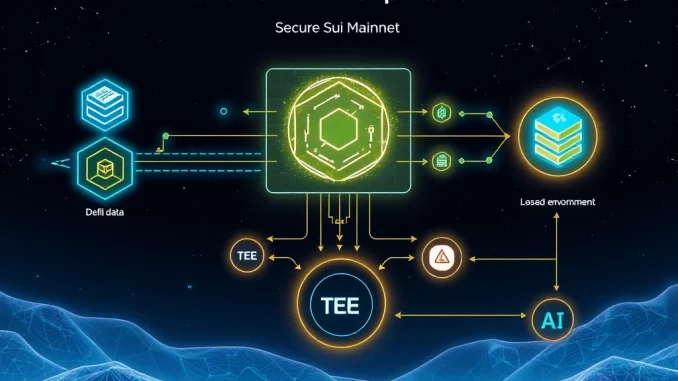
The world of Web3 is constantly evolving, pushing the boundaries of what’s possible on decentralized networks. A significant leap forward has just landed on the Sui Mainnet with the official launch of Nautilus. This isn’t just another integration; it represents a powerful step towards enabling complex, private, and scalable computations off-chain while maintaining verifiability on-chain.
What is Nautilus and Why is it on Sui Mainnet?
Nautilus is a platform designed to bring verifiable offchain compute capabilities to blockchain networks. Its arrival on Sui Mainnet is crucial because while blockchains like Sui are excellent for secure, transparent, and immutable transaction settlement, complex computations, large datasets, or sensitive private logic can be expensive and impractical to run directly on-chain. Nautilus addresses this by allowing these operations to occur off-chain in a secure, verifiable manner.
This launch on Sui is a collaborative effort, involving several key partners from the ecosystem and beyond. These include Bluefin, Volo, TensorBlock, OpenGradient, RegularTech, and Marlin. This collaboration highlights the ecosystem-wide commitment to enhancing Sui’s capabilities.
Deep Dive: Verifiable Offchain Compute Explained
So, what exactly is verifiable offchain compute? Imagine you need to perform a complicated calculation or process sensitive data for a decentralized application (dApp). Running this on the blockchain is slow and costly. Off-chain computation is faster and cheaper, but how can the blockchain (and its users) trust the result?
Verifiable offchain compute solves this trust problem. It allows computations to happen off the main blockchain network, but the results are produced in a way that can be verified or proven correct on-chain without re-executing the entire computation. This is where the technology Nautilus employs becomes critical.
The benefits of this approach are clear:
- Reduced Gas Fees: Less computation on-chain means lower transaction costs.
- Increased Speed: Off-chain processing is significantly faster than blockchain consensus.
- Enhanced Privacy: Sensitive data or logic can be processed off-chain without being exposed publicly on the ledger.
- Greater Complexity: Enables dApps to use algorithms and data processing previously impossible on-chain.
How TEE Technology Powers Nautilus
A core component of Nautilus’s approach to verifiable offchain compute is the use of Trusted Execution Environments (TEEs). What are TEEs?
TEEs are isolated, secure areas within a processor. They guarantee that data and code loaded inside them remain confidential and protected from external access or modification, even from the operating system or hypervisor. Think of it as a secure black box within a computer chip.
Here’s how TEE technology works with Nautilus:
- A dApp on Sui sends data and computation instructions to a Nautilus node.
- The computation is performed inside a TEE on the Nautilus node.
- The TEE ensures the computation runs correctly on the input data without tampering.
- A cryptographic proof or attestation is generated within the TEE, verifying that the computation was performed correctly within the secure environment.
- This proof is then sent back to the Sui Mainnet, where it can be verified on-chain.
This process allows dApps to trust the output of the off-chain computation because it comes with a verifiable guarantee from the TEE.
Boosting Web3 Security, Privacy, and Scalability
The integration of Nautilus and its TEE-based offchain compute brings significant advantages for Web3 security, privacy, and scalability, particularly across various application types:
For DeFi (Decentralized Finance): Complex trading strategies, risk assessments, or calculations involving private user data can be performed off-chain securely and privately, only submitting the final, verifiable result to the blockchain. This enhances privacy and enables more sophisticated financial products.
For AI (Artificial Intelligence): Running AI/ML model inferences or training on-chain is infeasible. Nautilus allows AI computations to happen off-chain within TEEs, providing a verifiable output for dApps. This opens doors for AI-powered dApps that require secure, private, and verifiable computation.
For Legal Contracts and Other Use Cases: Processing sensitive legal data, running complex simulations, or handling private inputs for smart contracts becomes possible without exposing confidential information on the public ledger. This expands the potential applications of Web3 beyond purely public data.
By offloading heavy computation and sensitive data processing, Nautilus helps improve the overall scalability of dApps on Sui, allowing them to handle more users and complex operations without overwhelming the main network.
The Future of Nautilus on Sui
The launch of Nautilus on Sui Mainnet is a pivotal moment. It equips developers with powerful new tools to build more sophisticated, private, and scalable dApps. The collaboration with partners like Bluefin, Volo, and others suggests a commitment to integrating this capability across different sectors within the Sui ecosystem.
As developers begin leveraging this TEE technology for verifiable offchain compute, we can expect to see a new generation of dApps emerge on Sui, pushing the boundaries of what’s currently possible in DeFi, AI, and beyond. This enhances the functionality and appeal of the Sui network for users and builders alike, strengthening the foundation for future Web3 innovation.
Conclusion: A New Era for Sui and Web3 Compute
Nautilus going live on Sui Mainnet marks a significant advancement in bringing robust, verifiable offchain compute to Web3. By utilizing TEE technology, Nautilus provides a secure and private environment for complex computations, addressing key limitations of on-chain processing. This development is set to enhance Web3 security, privacy, and scalability across critical sectors like DeFi and AI. With its ecosystem partners, Sui is positioning itself at the forefront of enabling more powerful and practical decentralized applications, paving the way for innovation and broader adoption.



